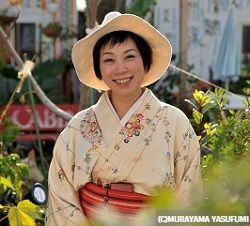Crossing Borders, Engaging in Exchanges and Harnessing the Power of Creation amid COVID-19
Interview and Contribution Series <6>
Ueda Kanayo, Poet and Activist
April 13, 2021
[Special Feature 073]
In this sixth issue of our special feature "Crossing Borders, Engaging in Exchanges and Harnessing the Power of Creation amid COVID-19"(click here for a special feature overview), we welcome Ueda Kanayo, who is a poet, activist and representative of the Non-Profit Organization Room for Full of Voice, Words, and Hearts (Cocoroom). The NPO runs a guesthouse and a cafe in Kamagasaki (also known as Airin District), Osaka City, and engages in expressive activities, including the Kamagasaki University of Arts*¹. Established in a belief that it is a "university" as long as there are people who want to learn from each other, it is a community-based initiative that considers the district as a university and provides various art and other workshops. While the guesthouse is suffering a decline in tourists caused by the pandemic, one of the guests tested positive for COVID-19 in July 2020. We asked how she handled the crisis and about her days under the pandemic with people who cannot stay home as requested by the government.
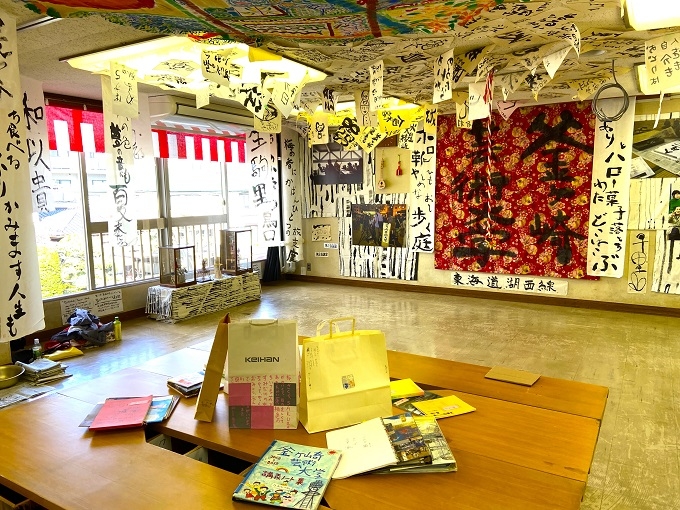 "Kotoba no Mushiboshi" ("Airing of Words, or Stars of Words"), an exhibition by the Kamagasaki University of Arts at Saitama Triennale 2020 (Photo courtesy of Ms. Ueda)
"Kotoba no Mushiboshi" ("Airing of Words, or Stars of Words"), an exhibition by the Kamagasaki University of Arts at Saitama Triennale 2020 (Photo courtesy of Ms. Ueda)- ──You've said that "the difficulty to live" is the origin of your work as a poet. How does that difficulty relate to expressing yourself?
- I think I was an overly sensitive, troublesome child. I wasn't good at speaking, so I wrote instead. I still remember verbalizing and writing down the feelings I discerned myself, and I've come to realize that I go back to the memory from time to time. In my opinion, making sure to express things you can only express at any given time is very important.
When I was about 17, I had a chance to talk with a refugee girl from Vietnam who was around my age. That experience broke my levees, making my antipathy toward adults overflow and a gap between my world and my friends' world to become apparent. I was on the edge, in short, and I expressed it in a poem. You must keep thinking almost to the point of breaking down before becoming able to express yourself and break through a wall. I didn't know that then, but I realized it later. Expressing yourself means to be in a natural human state. Also, since we humans can't live alone, we need an interactive cycle, which connects those expressing and those acknowledging and responding, in order to live freely and actively. Expression is a way to call out and to respond. I've come to think that this very cycle means to live.
Shortly after we moved our base to Kamagasaki, we met an old man who wouldn't open up. He was a regular at the cafe, constantly causing trouble and making himself very unpopular. Then, about 18 months later, he asked me to teach him how to write. It finally hit me that he was illiterate and that maybe his ways of expressing himself had always been denied by others.
It is hard for people to express themselves at a place where their existence is not acknowledged or accepted. I was educated to express my thoughts and have been carrying out activities based on the belief that to live is to express. But creating a place where people can express themselves together is far more important than the practice itself. This is the basis of expression for me. Kamagasaki taught me that.
Recently, I've been thinking a lot about what I call "one-person democracy." I'm not sure if that's the right term. Anyway, when that man kept causing trouble, all the staff demanded that I ban him from the cafe. I guess that was a natural reaction since he'd come to the point of causing some customers to leave when he was there. But for some reason I can't really explain, I said "No" to them. While it's true that I could do that because I was the representative, I kept taking him outside to listen to his story every time he stirred things up and asked him to leave because everyone was angry and to come back the next day after he calmed down.
This might have something in common to the COVID-19 pandemic. Even though the national and local governments tell you what to do and how to do it during the pandemic, we can still ponder over and decide what we should do. Should we follow their instructions? What does it mean to think things over on our own or voice our opinions? What will we do specifically? I think the pandemic has shed light on a thing like "one-person democracy."
After a state of emergency was declared, many public facilities in the local community were closed temporarily, and people lost a place to go. We had more freedom of choice because Cocoroom is a private facility not receiving any financial assistance or service consignment from the local government. I had discussions with the entire staff and decided to follow the request by operating the cafe for shorter hours. Expecting that the situation would continue for an extended period of time, we explored our own way to deal with the situation without shutting down the place completely.
I told the staff that I knew everyone was worried and wanted to talk things out before moving on. The basic stance of Cocoroom is to create a place where people can speak their true feelings, and I also hope to keep this stance when running the organization. It's actually very difficult, though.
I admit that many of the people frequenting Cocoroom are those who can't stay home even under the pandemic, those who have individual problems.
Inside Cocoroom, we have a space called Honmani Living Book Cafe where we give out recommended books that have been donated to our guests. Anyone can be the manager of the space. One day, a man came in and asked if he could be the manager. For some family-related reason, he couldn't stay home.
- ──It is important to create a certain role, or a reason to be there.
- Yes, I think so. For many people, constantly relying on others' kindness could be a burden. They may also think they owe them something in return for their kindness. If they have a reason to be there and a task that can give pleasure to someone, they will work willingly, and at the same time, can keep themselves together.
After the holiday week in May 2020, there was an influx of people into Kamagasaki who had lost their jobs and homes due to the pandemic. As there weren't sufficient accommodation and food support, Cocoroom provided meals using "paying it forward" tickets (food coupons) donated by our previous guests and supporters. One day, a man who used to run a company came to Cocoroom. Because of COVID-19, his company went bankrupt. He had lost money, spent a week sleeping on the street, found us on the Internet and came to Kamagasaki. I encouraged him to participate in an online career seminar.
In particular, a 30-year-old man I met in the same month left a deep impression on me. He had lived in a free welfare shelter for seven years and was unmotivated to do anything. Someone told him to visit Cocoroom several times, and he finally came. He had a meal with everyone, including some who had lost everything to the pandemic. Then he started coming more frequently, although he had some reservations about having meals using "paying it forward" tickets. One day, I encouraged everyone to watch a sunset from the rooftop because it was too beautiful to miss. He came along but didn't say anything. A few days later, he told me that he was never invited to watch a sunset together and that a sunset never looked beautiful to him.
He went on and mumbled that he didn't feel entitled to say the sunset was beautiful like everyone else because he hadn't lived his life "fully." When he voiced his feelings, I thought I heard his hidden message that he wanted to agree with everyone else and say, "It is such a beautiful sunset." That's probably similar to my verbalizing the sense of being on the edge when I was 17.
Then he began to say he actually wanted to work in Tokyo. He handwrote a self-introduction for an interview because he didn't have a PC, and I helped him by proofreading it day after day. He was rejected that time, but he went to Tokyo again and has been making efforts, albeit slowly, to find a job there. He literally completely transformed in just three or four months. I sent him off, telling him we would welcome him back in Kamagasaki any time if things didn't work out. I consider my involvement with him as "an encounter and expression" rather than "support."
- ──What made you get involved with people living on the street?
- I launched a project in Shinsekai, an area adjacent to Kamagasaki, in 2003. That's when my attention turned to people living on the street and to the town of Kamagasaki, where many day laborers who once supported the country's high economic growth live. Around that time, some locals from Osaka told me that homeless people are just pebbles on the roadside and I should ignore them. Then, an idea hit me in 2004 that maybe we can change prejudice against these people if they go up on stage and provide amazing expressions of themselves. Kamagasaki is heavily populated, full of eccentric people, and I run into interesting people every minute.
I've met a former pianist living on the street, who used to teach choral groups but lost everything to the Great Hanshin-Awaji Earthquake in 1995; a man hanging his haiku and other poems on the wall of his makeshift shelter; and a group of old men showing picture-story shows, who used to face homelessness and now live on welfare, to name a few.
I asked them to join me and perform on stage. The pianist said this would give him a reason to live. I also made an offer for him to help with the cleaning and other chores of Cocoroom and have staff meals with us so that he would be ready physically for the stage.
Another man said "No" at first but later texted me and asked me to train him so that he could be better and join the stage. I wondered how he, being homeless, could send me an e-mail. It turned out he had been living in a makeshift shelter and working in a bicycle shop. As per his request, we started practicing together right away.
Then, I realized the obvious, that these people are all different individuals. And once on stage, it doesn't matter if a person performing with a microphone is an artist or homeless. I would like to have a relationship with them while respecting the individuality of each.
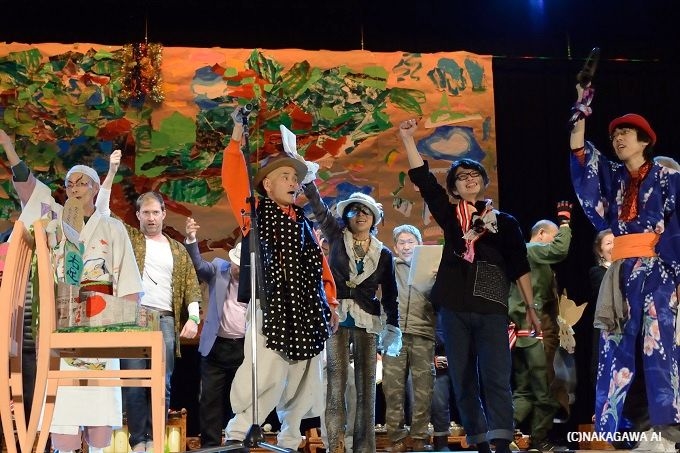 "Kamagasaki Oh!pera 2014," a stage performance of the Kamagasaki University of Arts. It was a super-long, eight-hour stage performance, basically an improvisation because they could not memorize the script. (Photo courtesy of Ms. Ueda)
"Kamagasaki Oh!pera 2014," a stage performance of the Kamagasaki University of Arts. It was a super-long, eight-hour stage performance, basically an improvisation because they could not memorize the script. (Photo courtesy of Ms. Ueda)- ──Was it like the stage wasn't just a means to help them, but you genuinely enjoyed the way they expressed themselves?
- To be honest, it was not that I was impressed by the piano performance of the former pianist. But I was deeply touched by the look in his eyes and his tone when he said this would give him a reason to live. I still remember them clearly.
At that time, he had lost many things. He thought everything was over and had no reason to live. He drifted to Kamagasaki, and one day, at Sankaku Park where many laborers without jobs or homeless people hang around, he found a half-broken electronic piano and played Bach. He thought these people rather love sentimental enka (Japanese traditional balladic songs) and would complain, but he felt like playing Bach so he did. When it was over, the men asked him to play more, offering a glass of sake.
Then one day he was wandering around, looking for a place to play, and saw an upright piano through the window of Cocoroom. He came in and asked if he could play it. That's how I met him. Later, he told me about his wishes for starting over his life with music.
Listening to their stories made me think that people live more fully when they become brave enough to express themselves regardless of their origins or current situations. Also, if they sincerely tell their stories and express themselves, it may give people struggling to find a reason to live a chance to think about or discover something. I was nurturing this hope while engaging with them.
I feel touched when I visit theaters, art museums and so-called art houses. But then again, these are not the only places that reach out to me. Like Sankaku Park and a makeshift shelter with haikus and poems hung on the wall, expression is always right by people's lives. Or rather, conventional art and cultural activities are being strictly confined to theaters and museums or "molded" to match the prestigiousness or the programs of certain awards.
Men in Kamagasaki do give their own ideas and opinions about art activities. If we have a chance to visit a museum or an art production workshop, they participate with keen interest. Well, in such a case, we need to be invited by an event organizer and think about how to come up with traffic expenses, because we are basically struggling for money.
I believe supporting and invigorating expressive activities of these ordinary people will broaden the audience base of high art (as opposed to low, popular art), attract empathy and add more meaning or greater value to it, rather than overriding it.
Experiences that ordinary people have in expressing themselves and in having their expressions acknowledged and appreciated by someone else as well as cherishing human relationships established through artistic expressions will provide inspiration to those who engage in the creation of high art. It will in turn bring depth to the lives of ordinary people. It generates a cycle here as well. People nurture diverse viewpoints by engaging in different jobs and facing many difficulties, which often surprises me.
- ──The practice of Cocoroom to accept anyone is not something that can be done easily.
- I think we've been able to do so because our activities are based on expression. The articles of incorporation of Cocoroom only state we will explore the relationship between expression and society. They don't specify for whom we will work. Hence anyone. But we can't do everything. There are many supporting organizations in Kamagasaki, and we often ask for help.
I like a patchwork of relationships. We will be in trouble if we only have one organization to seek advice or help if that organization is no longer of service. It's good for all of us, including those in need, that we have many people in many places to turn to and have a word with. I think we can avoid a deadlock by having a broad connection with various people.
I've come to realize that accepting people and continuing to create a place to do so takes time and is a challenge. Do we naturally know how to create such a place? Does the creation of such a place have a general versatility across society? I would like to find out. I think the answer to both is "Yes."
Sometimes, I feel Cocoroom still falls short of what I've advocated. Someday, I would like to create a place even surpassing Cocoroom by considering matters from various angles and verbalizing them. It will be exciting if there will be more of such places in our society.
- ──One of the guests staying at your guesthouse tested positive for COVID-19 in July 2020. You quickly announced it and explained what had happened.
- I felt really desperate. No organizations in this area had ever announced such a case. The Internet search only came back that whether to make such an announcement depended on each case. I had to make a decision under pressure.
What I decided was to announce it straightforwardly. By doing so, we can make clear our thinking and course of action in this uncertain situation. We can also add updates as needed. The information may be helpful to other people as this can happen to anyone. It is important to decide what to do by ourselves, and this could only be done through expression, by letting everyone express and fully discuss their thoughts, doubts and concerns. Expression is at the core of our activities, and this time we ourselves had to work up the courage to do just that.
Another thing we had to think about was our custom of eating together. At Cocoroom, guests, staff and everyone else have had meals together for 18 years. Cocoroom was closed for two weeks, and we discussed about it before reopening the place. We serve food on large plates to share among people at the table. We had to stop this practice if we were to prevent infections. Either way, the staff are the ones who must explain to our guests. The discussion started on a low note, with negative comments. When I realized the staff had qualms about having meals together, I began to wrap up the meeting with the decision to stop serving food until things calmed down. Then, one of the long-stay guests asked me why we've been doing it, saying if it's continued for 18 years, there must be reasons.
So I gave three reasons. First, I want to help my staff stay healthy by eating together, as their jobs often force them to have meals at irregular times, and to make up for their low wages if only slightly. Second, eating with guests will break the ice and encourage them to talk about their own difficulties, worries and personal interests. As such, having someone to talk to is probably something needed by society. It has also guided the Cocoroom project. Third, we don't waste food this way, as people at the table just take the needed amount of food from each plate using servers and leftovers will be kept for the next meal.
As soon as I finished, one of the staff in charge of the cafe looked up and said, "Let's continue" and asked me to write these reasons down. The atmosphere changed.
In the second semester of 2020 of the Kamagasaki University of Arts, we have been surveying food loss in collaboration with Osaka University and thinking about a food cycle in one program. We are trying to find out what we can do as a community to establish a food cycle. Restaurants and stores just throw away leftovers, and this seems a common practice in our society. Perhaps, Cocoroom's approach of not throwing away food represents my "one-person democracy."
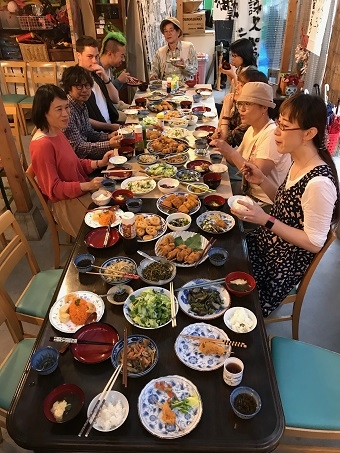 Having meals together, sharing lunch and dinner served on large plates every day (Photo courtesy of Ms. Ueda)
Having meals together, sharing lunch and dinner served on large plates every day (Photo courtesy of Ms. Ueda)- ──It is interesting that eating is also an expressive activity, and expressing your thoughts has enabled you to keep your custom of eating together.
- Yes, it's interesting. I wasn't really sure what it meant when we started having meals together at Cocoroom. I often called it "having meals at home" because the way of Cocoroom is very much like home life. Even family members can be "strangers" and all sorts of things can happen. They aren't an expert and are sometimes taken aback, but they try their best to keep the family together, just like us at Cocoroom. It is also important to talk to someone to relieve our feelings and ask experts, anyone, to help us when we are not sure.
- ──Cocoroom maintains that "life is a theater each passing day."
- We try to accept anyone and anything, and by regarding our activities as a play without a script at the theater, Cocoroom will give us a "panoramic" view and make things a bit more interesting. I often laugh with the staff, saying we are having many actors today.
I also believe that when we speak up, the first audience to hear it will be ourselves. Expressing means to take something out of me, and then look at it, understand it and respond to it from the perspective of another person.
- ──You've said earlier that expressing something in a difficult time will give you power later. Is that because you also hear your own voice?
- When you express something, you choose something, be it a word, a color or a line you draw. I think making a choice is to become aware of your thoughts, from which you develop another thought and reinvent yourself.
Once I visited a slum in Thailand. A volunteer who took me to a children's art class said that these children would lead difficult lives but their experience of choosing colors and drawing lines, in other words, thinking and making a choice on their own, will surely help them navigate through these difficult lives. These words stand out in my memory.
- ──Without knowing it, those men in Kamagasaki might have made a certain choice when they performed on the stage.
- I agree. Maybe they were not aware that they made a choice. They'd probably just been carried away in their lives. But this time, they did stand on their own feet on the stage to express themselves. Since people who come to see performances of the Kamagasaki University of Arts are generous and warm-hearted and give us a big hand, it would have been a moment for them to feel their lives have been acknowledged.
The Kamagasaki University of Arts also participated in Yokohama Triennale 2014. At first I wasn't sure if we should participate because there had been criticism that the works of people of Kamagasaki were of low quality, and I didn't want to hear it again. I finally made up my mind to join the event, thinking that even if famous art critics or other people say something negative about the expressions of people of Kamagasaki, I would just say "I like them and I find them amazing!"
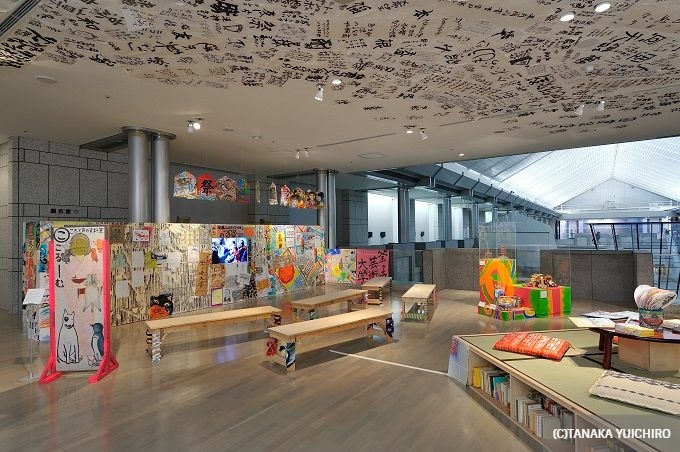 "Is THAT your choice instead of my meals?", an exhibition by the Kamagasaki University of Arts at Yokohama Triennale 2014 (Photo courtesy of Ms. Ueda)
"Is THAT your choice instead of my meals?", an exhibition by the Kamagasaki University of Arts at Yokohama Triennale 2014 (Photo courtesy of Ms. Ueda)- ──Cocoroom claims to be a "place for encounters." What is your thought on "meeting new people" in the future?
- We've realized how important encounters are because of the pandemic. Are there any other ways to meet new people now? Is online communication the only option? I don't know. It's really hard to say.
During the pandemic, we have heard the term "essential work" very often and come to appreciate those who are risking their lives to support our daily lives. Transportation operators and delivery service providers deliver our packages. People working in supermarkets and convenience stores make sure there are enough supplies. There are also farmers, other producers and people maintaining the infrastructure. Their work allows us to live. In this context, it is important to appreciate the people around us and value our daily encounters in the community.
- ──I heard that you've raised funds through crowdfunding because of the pandemic. Is running Cocoroom still difficult?
- I raised 4 million yen through crowdfunding, which is eight months' worth of house rent. I still have to pay the staff and other expenditures. So yes, running Cocoroom is still difficult.
It also seems that the guesthouse business will continue to be hard for one or two more years, which I'm still deciding what to do. People from other countries had accounted for half of our guests, and seminar groups of university students had been a major source of our income. As such, we are in a financially tight position. It'd be nice to have a "Go To Kamagasaki" campaign, just like the government's "Go To Travel" campaign.
- ──Accepting and living in harmony with different people have become an issue now. I think we can learn a few things from Cocoroom.
- It's becoming a huge issue in society. What I've learned through Cocoroom is that difficult people are people having difficulties. They have reasons to be difficult. If we can find out what their reasons are, it will give us a clue to help them solve their difficulties.
When two persons have different opinions, they can frankly tell what they think to each other and feel better by acknowledging the difference and understanding the other's way of thinking. For both sides, "feeling better" is the key. I think "being able to tell" is another key. We feel frustrated and get upset if something moves ahead before we get to speak up, don't we?
- ──If we aren't given a chance to say our opinions, we complain and really hold a grudge (laughs).
- True (laughs). I was a kid full of grudges because I was terrible at speaking. That's why I wrote.
- ──You also have written poems.
- Yes. But I've taught myself to speak up more often. I've also realized that learning to tell involves failures. As a first step, I want people to understand failures are a part of the process to understand each other. Then, I would like to proceed to create an environment where we accept each other's failures. We should start with a small environment in a family or among friends or workplace colleagues. Without practicing first with a small group of people, you wouldn't be able to speak up in front of a large audience.
I wish there are more places in society to talk and listen to each other. I believe providing such places is a role of arts and culture. Of course, local governments and citizens' activities could also assume the role, but learning to talk and listen to each other through failures is more like a cultural activity.
As Cocoroom is an art-oriented NPO that values expression, we will continue to advocate expression in the future as well. The pandemic has given me a stronger motivation to do so.
- ──Facing the pandemic, you've said a crisis provides an opportunity. Does this mean you've learned a lot from the pandemic?
- It appears that I must feel really cornered before I can make decisions and learn. It's a pity (laughs).
- *¹ The Kamagasaki University of Arts: A community-based initiative that offers some 100 workshops a year on such topics as astronomy, philosophy and aesthetics at various venues in Kamagasaki since 2012. Also visits junior and senior high schools in the neighborhood to deliver lessons.
Official website: http://kanayo-net.com/
NPO Room for Full of Voice, Words, and Hearts (Cocoroom): https://cocoroom.org/cocoroom/en/
Online interview in September 2020
Interview/text: Terae Hitomi (Japan Foundation Communication Center)
Related Articles
Back Issues
- 2025.11.14 Stories from Both Si…
- 2025.10.24 Dialogue through Ani…
- 2025.6. 9 Creating a World Tog…
- 2024.10.25 My Life in Japan, Li…
- 2024.5.24 The 50th Japan Found…
- 2024.5.24 The 50th Japan Found…
- 2024.5. 2 People-to-People Exc…
- 2024.5. 2 People-to-People Exc…
- 2023.12. 7 Movie Theaters aroun…
- 2023.6.16 The 49th Japan Found…


